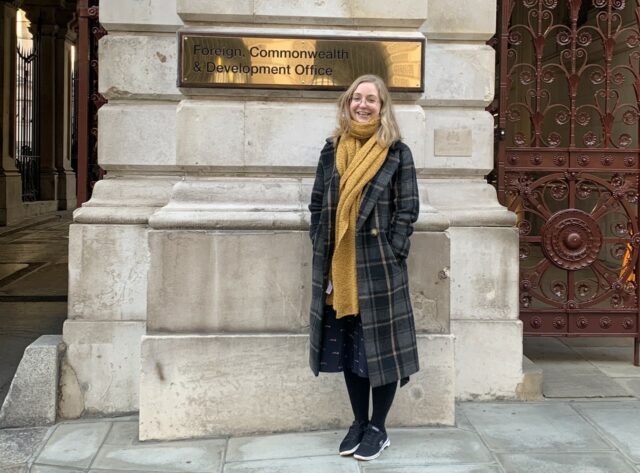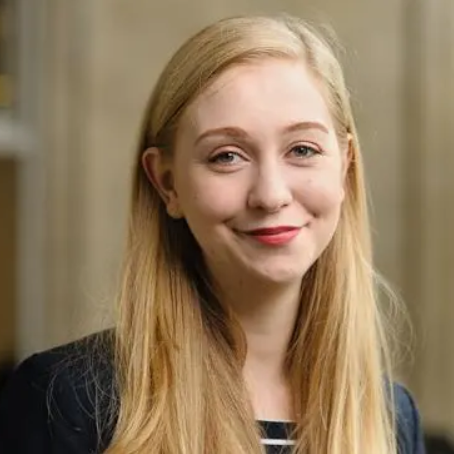Dr Charlotte Albury, Mildred Blaxter Fellow in Health Behaviours and a Somerville Junior Research Fellow, finds ways to improve the outcome of medical interventions by studying the communication between healthcare professionals and their patients. Her research brought her to an unexpected destination: the heart of UK government…

Dr Charlotte Albury at the Foreign, Commonwealth and Development Office
Last December, I found myself peering through the front door window of number 10 Downing Street before walking through the long echoey corridors of the UK Foreign Commonwealth and Development Office (FCDO), where I lead a briefing for their specialist medical teams and Chief Medical Officer.
How did this all come about?
I’m a specialist in health communication working in the university’s health behaviours team (part of the Department of Primary Care). I spend most days analysing real clinical conversations to find out exactly what aspects of communication, such as words, pace, intonation, grammatical design and sequential placement, can support changes to health behaviours. Essentially, I look at the importance of how you communicate in healthcare.
The pandemic has brought sharp focus to the importance of health communication and its relationship to our behaviour: the virus has bought significant uncertainty, and no established practice of how best to share the specific risks and unknowns.
In early 2020 I was contacted by the Foreign Office’s Chief Medical Officer, who was seeking to develop a research project to find out how best her specialist medical teams could communicate COVID risk advice to people about to travel. Having seen senior behavioural scientists’ expert advice overlooked throughout the pandemic, I particularly admired the FCDO team’s dedication to develop advice and training based on real evidence and put it into clinical practice.
One flurry of applications and ethical approvals later, my work began to identify how clinicians could communicate to potential travellers about COVID risk, repatriation procedures, and risk mitigation behaviours. Myself and my team listened to and analysed real recorded patient consultations led by FCDO clinicians. Our aim was to find out what worked and develop new training to optimise communication abut COVID risk.
This approach can be brilliantly rewarding. Sometimes, suddenly, you hear a conversational pattern that just ‘works’. You see it again used by someone else, look tentatively for the same response, and there it is! It’s worked again. And again. And again (although sometimes it is not quite so simple).
In this context of risk communication I noticed a complex group of approaches to qualifying, quantifying, and then contextualising personal risk that just worked when used together at a particular point in the conversation and in a particular order. We also found the choice of words in initiating the conversation was important, with ‘talk’ having more success than ‘chat’. I shared these findings with the FCDO’s international clinical teams, who plan to implement this new evidence, and in early 2022 I’ll begin training the clinicians who communicate COVID risk day-to-day.
I work in health behaviours research because I’m keen to improve care. The highly specific nature of an approach based around analysing real conversations means that advice and training can be equally specific, showing where and how risk information can be best communicated, what common problems may be, and how they can be best avoided. This allows for the smooth translation of results into improvements to practice, and overseeing this process has been a real highlight for me.

Dr Charlotte Albury